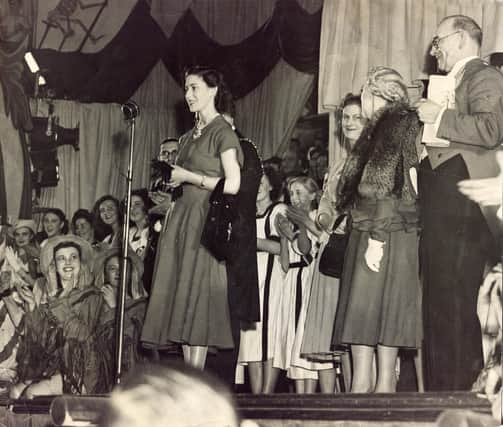Monica Makes Sense: When coming out meant something very different


At one time, coming out didn’t refer to a person’s sexual persuasions. It was when being gay meant that you were happy, and if you were feeling a little queer, that you felt somewhat unwell.
Coming out actually meant at the time the presentation at court of a female from upper class or aristocratic families. It was a means of introducing her to society at a time when she was considered to have reached ‘womanhood’.
Advertisement
Hide AdAdvertisement
Hide AdIt also meant that the young woman in question was eligible to marry and of course, it was very important that she should make the best possible match, meaning someone from similar select upper-class circles.
The cost of a season in 1954 could, in today’s terms, be as much as £120,000 and parents expected a good return for their money.
Many mothers held up Sally Croker-Poole as an example to their daughters, who had been one of the last debutantes in the UK and married the Aga Khan.
The marriage didn’t last, but he left her with immeasurable wealth.
Advertisement
Hide AdAdvertisement
Hide AdIn 1995 she sold some of her jewellery at Christie's for £27 million. What more could a girl, or her mother, ask for?
Some girls broke away from the expected.
There was an IRA freedom fighter called Rose Dugdale, an International Marxist called Teresa Hayter, with Jennifer Murray becoming a helicopter pilot.
Also among the debutantes was the girl who married pop star Georgie Fame, but who unhappily committed suicide.
There were those who flaunted convention and ran away from the possibility of ending up with a ‘debs delight’, literally, when Isabel Patino, the South American mining heiress eloped to Gretna Green with Jimmy Goldsmith and Tessa Kennedy ran away to the West Indies with Dominic Elwes.
The gossip columns were full of the scandals.
Advertisement
Hide AdAdvertisement
Hide AdThe presentation at court marked the start of the British social season. This was primarily for young people of marriageable age to find a husband or wife of the correct social standing.
After the presentation, the festivities started with a vengeance. Afternoon tea parties, polo matches, race meetings at Royal Ascot and, of course, numerous balls.
Many debs had their own ‘coming out’ party with a carefully selected guest list. The young men were labelled, perhaps unkindly, ‘chinless wonders’ as it was thought that many upper-class males had receding chins thought to be a result of inbreeding, in particular to the lineage of Queen Victoria and the House of Windsor.
The idea certainly for young women was that they should be engaged by the end of the season and the whole thing was described by one ex-debutante as being like a cattle market.
Advertisement
Hide AdAdvertisement
Hide AdVirginity was a must, which didn’t stop many young men from trying it on. The girls had acronyms for them, like NSITs (Not safe in taxis) or MTF (must touch flesh).
In 1958, Queen Elizabeth discontinued the court presentations, with Prince Philip saying the whole thing was ‘bloody daft’, while Princess Margaret, herself no stranger to the gossip columns, said: “We have to put a stop to it. Every tart in London is getting in.” Pot calling kettle?
It seemed to signify the end of the Establishment, and the ‘old boy network’, or so it was thought, with many ex-debutantes preferring to forget they had ever been part of that scene, especially as popular culture began to refer to them as vacuous and flighty socialites.
It was part of a changing Britain where women were becoming increasingly emancipated and embracing feminism, realising lmarriage to a rich man was not their only option as a life choice. They wanted further education and careers.
Advertisement
Hide AdAdvertisement
Hide AdIn any case, there was no longer going to be the long procession of virginal young ladies in white wedding dresses at Queen Charlotte’s Ball.
Virgins were starting to be in short supply at the end of the 1950s. The pill had arrived!
The face of the rich was also changing.
At one time, the rich were from privileged, possibly aristocratic backgrounds. Now the face of the rich could be from all walks of life. Self-made tycoons, musicians and other entertainers, giants of industry and commerce, sportspeople.
The face of private schools was changing. You no longer needed connections and supposed breeding. You just needed the money!
Advertisement
Hide AdAdvertisement
Hide AdHowever, debutantes didn’t disappear completely. Queen Charlotte’s Ball was resurrected. No longer with Royal patronage or solely for the elite or wealthy, it was open to anyone who could afford to buy a table.
Many of these were sponsored by the wealthy from the UAE, Russia and other countries. A place at the ball was purchased, rather than being a birthright.
One of the balls a year or so ago was held at Highclere Castle, used to depict ‘Downton Abbey’, home of the fictional Earl of Grantham.
One wonders what Downton Abbey’s Dowager Countess of Grantham, played by Maggie Smith, would have thought of it all. She had an opinion on most things. Saying once that ‘if I were to search for logic, I wouldn’t look for it amongst the English upper classes’.
I expect she gave short shift to ‘chinless wonders’ when she came out.